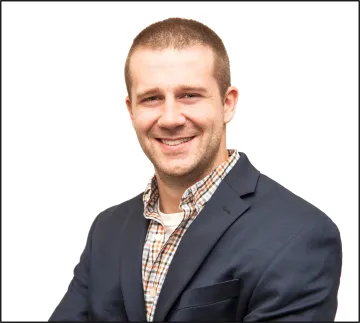When
Presenter:
Dr. Boone Prentice

Assistant Professor, Department of Chemistry, University of Florida
Abstract:
Imaging mass spectrometry is a powerful analytical technique for analyzing the spatial lipidome. This technology enables the visualization of molecular pathology directly in tissues by combining the specificity of mass spectrometry with the spatial fidelity of microscopic imaging. This label-free methodology has proven exceptionally useful in research areas such as cancer diagnosis, diabetes, and infectious disease. However, state-of-the-art experiments stress the limits of current analytical technologies, necessitating improvements in molecular specificity and sensitivity in order to answer increasingly complicated biological and clinical hypotheses. Especially when studying lipids, many isobaric (i.e., same nominal mass) and isomeric (i.e., same exact mass) compounds exist that complicate spectral analysis, with each structure having a potentially unique cellular function.
The Prentice Lab develops instrumentation and novel gas-phase reactions to provide unparalleled levels of chemical resolution. These gas-phase transformations are fast, efficient, and specific, making them ideally suited for implementation into imaging mass spectrometry workflows. For example, these workflows have enabled the identification of multiple sn-positional phosphatidylcholine isomers, the separation of isobaric phosphatidylserines and sulfatides, and the identification of fatty acid double bond isomers using a variety of charge transfer and covalent ion/ion reactions as well as ion/electron and ion/photon reactions. Working with biologists and clinicians, we then leverage these novel imaging technologies to understand the molecular events associated with important problems in human health, including infectious disease, diabetes, and neurodegenerative diseases.
Biosketch:
Boone Prentice is Assistant Professor in the Department of Chemistry at the University of Florida. He received his B.S. in Chemistry from Longwood University (Farmville, VA), and completed his Ph.D. in Chemistry at Purdue University (West Lafayette, IN) under the mentorship of Prof. Scott McLuckey studying gas-phase ion/ion reactions and ion trap instrumentation. He then completed his postdoctoral work in the Department of Biochemistry at Vanderbilt University (Nashville, TN) as an NIH NRSA fellow under the guidance of Prof. Richard Caprioli before joining the faculty at UF in 2018.
He was awarded an NIH Focused Technology Research and Development R01 grant in 2020 and a JDRF Innovation Award in 2023 to support his research developing gas-phase reactions and imaging mass spectrometry technologies to study the molecular pathology of diabetes, infectious disease, neurodegeneration, and neuropharmacology. He was also awarded the 2022 Young Investigator Award from Eli Lilly and Company, which is an unsolicited award given annually by Eli Lilly’s Analytical Chemistry Academic Contacts Committee to recognize a “rising star” in analytical chemistry, and was highlighted as a 2023 Emerging Investigator by the Journal of the American Society for Mass Spectrometry and as a 2023 Young Investigator in (Bio-)Analytical Chemistry by Analytical and Bioanalytical Chemistry.






